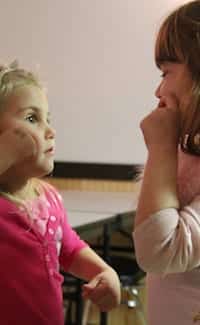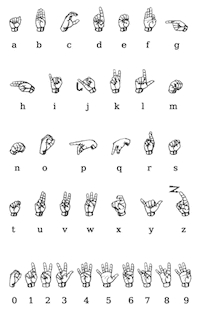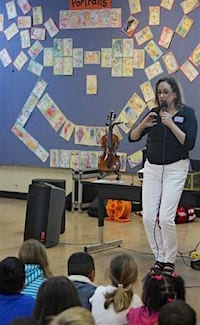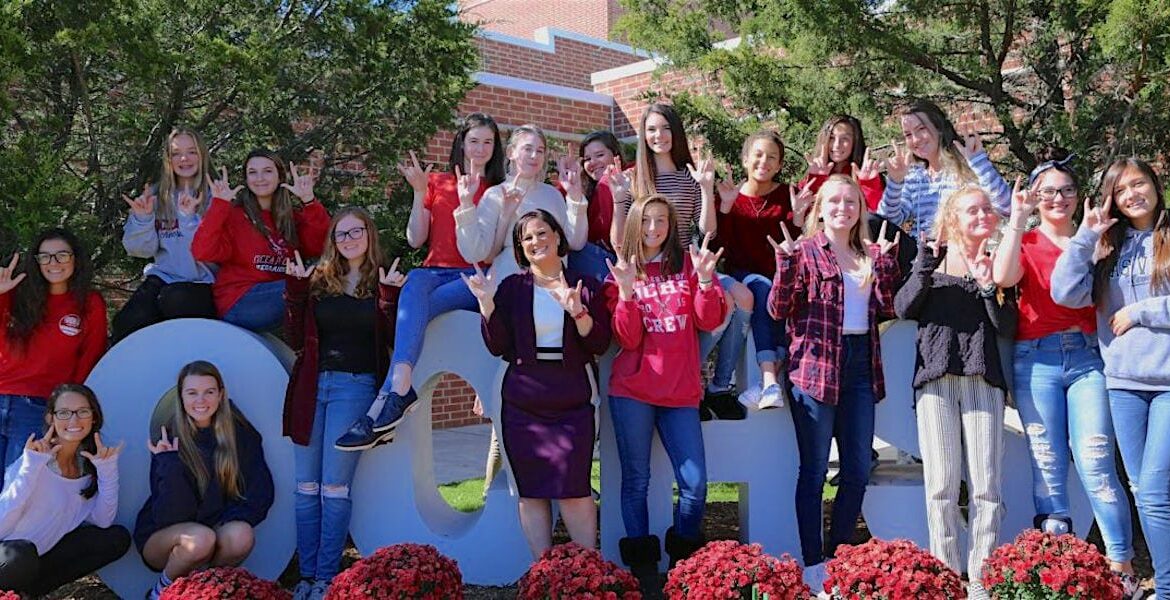Everyone has a voice, no matter how different, whether spoken or signed
By Amy Andersen, NBCT
 When I was seven years old, my mother took me with her to a sign language class two nights a week. I remember immediately connecting with signing and practicing all the time – I loved those classes. Things changed once I entered grade school. I started playing the flute and the more I practiced, the better I seemed to get. Although that instant connection to signing never left, my focus became music and I committed to becoming the best I could be. By high school, I was going to Philadelphia every weekend for private lessons and woodwind quintet rehearsal, even performing in Moscow, Russia. Pursuing music performance was the logical path to take after high school. As one of only four flute players to be accepted, I was honored to be going to Indiana University, where I would study with Peter Lloyd, principal flutist from the London Symphony. The feeling of playing with an orchestra, with the music happening all around me and through me, was magical.
When I was seven years old, my mother took me with her to a sign language class two nights a week. I remember immediately connecting with signing and practicing all the time – I loved those classes. Things changed once I entered grade school. I started playing the flute and the more I practiced, the better I seemed to get. Although that instant connection to signing never left, my focus became music and I committed to becoming the best I could be. By high school, I was going to Philadelphia every weekend for private lessons and woodwind quintet rehearsal, even performing in Moscow, Russia. Pursuing music performance was the logical path to take after high school. As one of only four flute players to be accepted, I was honored to be going to Indiana University, where I would study with Peter Lloyd, principal flutist from the London Symphony. The feeling of playing with an orchestra, with the music happening all around me and through me, was magical.
While at school in Indiana, I began taking American Sign Language classes, getting involved with the deaf community and volunteering in a kindergarten classroom of deaf students. And I fell in love – again – it’s what I wanted to do all the time and although performing for an audience was extremely gratifying, what I felt when working with children was different than anything I had experienced up until that point. There was something pulling me towards teaching. I thought about how I wanted to make an impact on the world … through performing on stage or inspiring children? I found the courage to follow my instincts and trust myself. Holding my breath, I made that phone call home.
“Mom, dad … I really want to be a teacher, and I want to work with deaf children.” My parents, both teachers themselves, listened… there was some grieving because we had all invested so much for this life as a musician but they supported my decision. I had found my life’s passion, how I would contribute to the world around me. This is a story I always share with my high school students because I want every one of them to find what I did: a profession I love waking up to every single day.
Striving to be better for my students
I graduated from college and went on to earn a master’s in deaf education. The other graduate students, including my roommate, were all deaf, many of the professors were deaf, and most of the classes were taught in ASL, not spoken English. I became immersed in ASL and deaf culture, and I loved it. I felt challenged and alive! I can still remember the moment it dawned on me during my practicum at Maryland School for the Deaf; I was teaching and signing and my 3rd graders inspired me to want to be better for them. I realized in that moment, “I get to do this for the rest of my life!”
 Now, I’ve been teaching for 21 years and I know it was absolutely the best decision I ever made. Year after year, my students inspire me to give more of myself, to keep learning and to guide them to successes they never thought possible. Being a teacher is one of the biggest honors of my life, aside from being a mother to two exceptional little boys. But with this honor comes great responsibility because every day we, as teachers, are showing our students what we believe is a priority.
Now, I’ve been teaching for 21 years and I know it was absolutely the best decision I ever made. Year after year, my students inspire me to give more of myself, to keep learning and to guide them to successes they never thought possible. Being a teacher is one of the biggest honors of my life, aside from being a mother to two exceptional little boys. But with this honor comes great responsibility because every day we, as teachers, are showing our students what we believe is a priority.
I believe that strength of character must be our priority, empowering our children with the indisputable guarantee that everyone has a voice, no matter how different, whether spoken or signed and it is our human right to communicate. We must show our students through action, that every voice has value and that we are stronger because of our differences, not in spite of them.
When I look out at my class of high school American Sign Language students, I know some of them are going to do great things in the deaf community, like my students before them who have interpreted for Michelle Obama or Madonna. I know there are students like Michael, who tested into ASL 5 as a freshman in college. Michael captivates every audience member, hearing or deaf, when he performs, signing songs as part of a theatrical production. I know one day he will interpret on Broadway, or join the Deaf West Theater. Students like Liz and Makenzie who have volunteered countless hours with a deaf toddler in the community, playing and signing with him. They may become advocates and push for legislation that will guarantee language equality for all deaf children.
I also know that not every one of my students will fall in love with ASL, like I did. But, they will all contribute to society, in one way or another. They will influence those around them. What lessons will they take from their time with me? What lessons will I glean from them?
After a recent survey, I discovered that 65% of my students have been testing right into ASL 3 college level classes after they graduate from high school. More than 85% of my students have achieved the Seal of Biliteracy in the past three years, which requires them, as high school seniors, with only 2 or 2 ½ years of ASL, to pass the same sign language exam teachers of the deaf are given to earn state certification. My students are completing their college degrees and getting jobs as interpreters, speech pathologists and teachers all over the country. My students are learning and excelling in American Sign Language, and for that I am exceedingly proud.
Challenges facing the deaf community
What makes teaching one of the things in life I am most thankful for, are the exceptional human beings I see evolving in front of me. As we learn about the oppression felt by the deaf community throughout history,  we talk about diversity, we talk about empathy and understanding, and shifting the perspective of deafness as a disability to the realization that there is a rich culture with arts and literature, theater, a shared history, shared language and a set of ideals.
we talk about diversity, we talk about empathy and understanding, and shifting the perspective of deafness as a disability to the realization that there is a rich culture with arts and literature, theater, a shared history, shared language and a set of ideals.
While changing our views about the deaf community, I encourage students to apply the same principle to every individual. I encourage them to apply the same principle to themselves, because that is often what they struggle with in their teen years. We are all different in our own unique ways, and our children are trying to figure out who they are; do they fit in? Does their voice have value?
As the 2018 NJ State Teacher of the Year and also a National Board Certified teacher, I will soon have the opportunity to travel the state sharing the message that difference in others doesn’t take away from us; it brings us together. Teaching is a means to establish equity so that every child has the opportunity to achieve excellence
I have a year, sometimes 2 or 3 to show my students a place where deafness, where everyone, is not only welcomed but celebrated, because diversity enriches all of our lives. This destination is universal, a place every teacher can reach. Learning ASL and about deaf culture are just the vehicles I use to get my students there.
This article was originally published by the National Board for Professional Teaching Standards.
Author
 Amy T. Andersen, NBCT is a high school American Sign Language (ASL) teacher at Ocean City High School in the Ocean City School District. She earned a bachelor’s degree in flute performance from Indiana University and a master’s degree in deaf education from McDaniel College. Amy also achieved National Board Certification in Exceptional Needs Specialist: Deaf/Hard of Hearing.
Amy T. Andersen, NBCT is a high school American Sign Language (ASL) teacher at Ocean City High School in the Ocean City School District. She earned a bachelor’s degree in flute performance from Indiana University and a master’s degree in deaf education from McDaniel College. Amy also achieved National Board Certification in Exceptional Needs Specialist: Deaf/Hard of Hearing.
After nine years in Boston, Massachusetts as a teacher of the deaf, she returned to New Jersey in 2004 to raise a family. It was then, with 42 students, that Amy T. Andersen began the American Sign Language (ASL) program at Ocean City High School. It has since grown to 130 students under her tutelage. Amy T. Andersen is a nationally recognized educator who began her career teaching deaf children to fall in love with reading.
She now teaches hearing children to fall in love with ASL. Among her many recognitions, Amy T. Andersen was named the 2014 ASL Teacher of the Year and was honored by the New Jersey Association for the Deaf and Atlantic County Society for the Deaf. In 2015, “Classroom Close-Up NJ” highlighted her program after her students’ ASL anti-bullying video went viral. As Ocean City High School’s Teacher of the Year, Amy T. Andersen was with articles in the New Jersey School Board Association’s School Leader and was recently honored by the National Liberty Museum with the Teacher as Hero: Exceptional Teacher Award.
Andersen is the 2017-18 New Jersey State Teacher of the Year and is currently in the running for National Teacher of the Year.
Follow Amy Andersen on Twitter
Further Reading
- EdWeek – 7 Ways to Bring Out the Best in Special-Needs Students
- TeacherVision – Teaching Students with Special Needs
- edCircuit – A Timeless Flight





